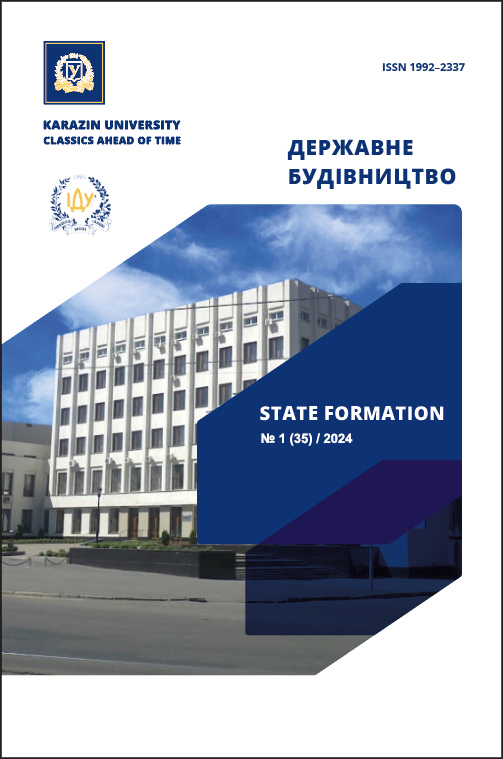Creating a New ‘Place’: How Renewed Immigration and Integration Policies and Public Governance Can Aid the Development of Ukrainian State-Owned Enterprises?
Abstract
The article is dedicated to discussing the theme of creating a new "place" in the renewed policy and public governance regarding immigration and integration. The aim of the article is to develop the conceptualization of the idea of "place-making" together with immigrants in post-war Ukraine as a new element of public immigration policy and the policy of developing large state corporations. The article begins with a discussion of recent contemporary ideas and concepts regarding the integration of immigrants and how the experience of immigrants is viewed as something separate from the places where immigrants live, as a result of which immigrants are considered responsible for their own integration. The article concludes that the concept of "place-making" in the context of immigration and integration of immigrants is a key element of the current scientific discourse. It reflects a dynamic process in which both immigrants and the local population actively participate in the formation of a new sociocultural space, and this concept goes beyond the framework of spatial assimilation, emphasizing mutual adaptation and transformation of society. Further, the article concludes that the proposed attempt to conceptualize "place-making" for Ukraine after the end of the war represents a comprehensive, multifaceted approach aimed at integrating and attracting three key groups: qualified immigrants, ethnic Ukrainians from the diaspora, and citizens of Ukraine who left the country in 2014-2023 due to the war. This approach involves the active participation of state corporations as key agents of change and platforms for integration. Large state enterprises and especially corporations such as Ukrzaliznytsia, Naftogaz, Energoatom, Ukrposhta, and others become not just employers, but centers of innovation, cultural exchange, and social integration. They initiate specialized programs such as "Innovative Railways," "Diaspora for Defense," "Energy of Return," which combine technological modernization with social integration.
Downloads
References
Hibadullin, O.V., & Dunayev, I.V. (2023). Towards a resilient industrial recovery of Ukraine: a study of regional systems in wartime. State Building: Electronic Collection, 2(34), 105–124. DOI: https://doi.org/10.26565/1992-2337-2023-2-09 URL: https://periodicals.karazin.ua/db/article/ view/23397 [in Ukrainian].
Dunayev, I., Kostiennikov, D., & Kushnir, V. (2023). Digital nomads: global tourists or new workers for post-war economic recovery of Ukraine? Pressing Problems of Public Administration, 2(63), 6–24. DOI: https://doi.org/10.26565/1684-8489-2023-2-01 URL: https://periodicals.karazin.ua/apdu/article/view/23505 [in Ukrainian].
Abdelhady, D., & Norocel, O. (2023). Re-Envisioning Immigrant Integration: Toward Multidirectional Conceptual Flows. Journal of Immigrant & Refugee Studies, 21(2), 119–131. DOI: https://doi.org/10.1080/15562948.2023.2168097
Arar, R. (2023). Contrasting Trajectories of Incorporation: Refugee Integration and the Global South. Journal of Immigrant & Refugee Studies, 21(2), 189–202. DOI: https://doi.org/10.1080/15562948.2022.2144658
Christiansen, H., & Kim, Y. (2014). State-Invested Enterprises in the Global Marketplace: Implications for a Level Playing Field (OECD Corporate Governance Working Papers No. 14). Paris: OECD Publishing. DOI: https://doi.org/10.1787/5jz0xvfvl6nw-en
Cresswell, T. (2015). Place: An introduction (2nd ed.). Wiley Blackwell.
Dunayev, I., Kuchma, M., Byelova, L., Jatkiewicz, P., Bilichenko, O., & Poberezhets, H. (2024). Wartime destruction: regional assessment of damage to Ukraine’s infrastructure. International Journal of Environmental Studies. DOI: https://doi.org/10.1080/00207233.2024.2314862
European Commission. (2004). Common basic principles. URL: https://ec.europa.eu/ migrant-integration/librarydoc/common-basic-principles-for-immigrant-integration-policy-in-the-eu
European Commission. (2010). Declaration of the European Ministerial Conference on integration. URL: https://ec.europa.eu/migrant-integration/librarydoc/declaration-of-the-european-ministerial-conference-on-integration-zaragoza-15-16-april-2010
Favell, A. (2022). Immigration, integration and citizenship: elements of a new political demography. Journal of Ethnic and Migration Studies, 48(1), 3–32. DOI: https://doi.org/10.1080/1369183X.2022.2020955
Gilmartin, M., & Dagg, J. (2021). Integration as Making Place. Journal of Immigrant & Refugee Studies, 21(3), 276–290. DOI: https://doi.org/10.1080/15562948.2021.1974148
Goodman, S., & Wright, M. (2015). Does Mandatory Integration Matter? Effects of Civic Requirements on Immigrant Socio-economic and Political Outcomes. Journal of Ethnic and Migration Studies, 41(12), 1885–1908. DOI: https://doi.org/10.1080/1369183X.2015.1042434
Huddleston, T., Niessen, J., & Dag Tjaden, J. (2013). Using EU indicators of immigrant integration (Final report for DG of Home Affairs). Publications Office of the European Union.
International Organization for Migration. (2024). Migrant Integration and Social Cohesion. URL: https://www.iom.int/migrant-integration-and-social-cohesion
Irish Central Statistics Office. (2020). Census of population 2016 – Profile 7 migration and diversity [Tables 7002, 7054]. Dublin: Central Statistics Office. URL: https://data.cso.ie/
Irish Central Statistics Office. (2020). Population and migration estimates April 2020. Dublin: Central Statistics Office. URL: https://www.cso.ie/en/releasesandpublications/er/pme/ populationandmigrationestimatesapril2020/
Korteweg, A. (2017). The failures of ‘immigrant integration’: The gendered racialized production of non-belonging. Migration Studies, 5(3), 428–444. DOI: https://doi.org/10.1093/migration/mnx025
Massey, D. (2005). For space. Sage Publications. URL:https://uk.sagepub.com/en-gb/eur/for-space/book227109
Meissner, F., & Heil, T. (2020). Deromanticising integration: On the importance of convivial disintegration. Migration Studies. https://doi.org/10.1093/migration/mnz056
Modood, T. (2019). Essays on Secularism and Multiculturalism. Madrid.
Nelson, L., & Hiemstra, N. (2008). Latino immigrants and the renegotiation of place and belonging in small town. Social & Cultural Geography, 9(3), 319–342. DOI: https://doi.org/10.1080/14649360801990538
Organisation for Economic Co-operation and Development. (2018). Gender differences in immigrant integration. Paris: OECD Publishing. URL: https://www.oecd-ilibrary.org/ docserver/9789264307216-10-en.pdf DOI: https://doi.org/10.1787/9789264307216-en
Organisation for Economic Co-operation and Development/European Commission. (2018). Indicators of immigrant integration: Introduction and overview. Settling in 2018: Indicators of immigrant integration. OECD Publishing, 17−35. DOI: https://doi.org/10.1787/9789264307216-5-en
Organisation for Economic Co-operation and Development/European Commission. (2023). Indicators of Immigrant Integration 2023: Settling In. Paris: OECD Publishing. DOI: https://doi.org/10.1787/1d5020a6-en
Parsons, L., & Lawreniuk, S. (2017). Love in the time of Nokia: Cultural change and compromise in a Cambodian migrant enclave. Population, Space and Place, 23(3), 2015. DOI: https://doi.org/10.1002/psp.2015
Phillips, D., & Robinson, D. (2015). Reflections on migration, community and place. Population, Space and Place, 21(5), 409–420. DOI: https://doi.org/10.1002/psp.1911
Platts-Fowler, D., & Robinson, D. (2015). A place for integration: Refugee experiences in two English cities. Population, Space and Place, 21(5), 476–491. DOI: https://doi.org/10.1002/psp.1928
Scholten, P., & Breugel, I. (2017). Mainstreaming Integration Governance: New Trends in Migrant Integration Policies in Europe. DOI: https://doi.org/10.1007/978-3-319-59277-0
Triandafyllidou, A., Bivand Erdal, M., Marchetti, S., Raghuram, P., Sahin Mencutek, Z., & Salamońska, J. (2023). Rethinking Migration Studies for 2050. Journal of Immigrant & Refugee Studies, 22(1), 1–21. DOI: https://doi.org/10.1080/15562948.2023.2289116
Wright, M., & Bloemraad, I. (2022). Is There a Trade-off between Multiculturalism and Socio-Political Integration? Policy Regimes and Immigrant Incorporation in Comparative Perspective. Perspectives on Politics, 10, 77–95.

